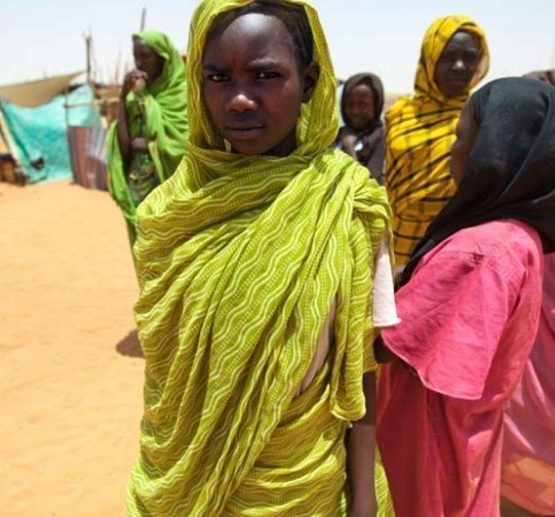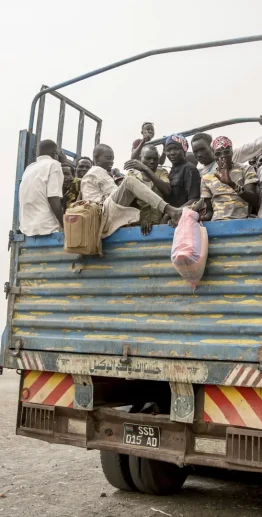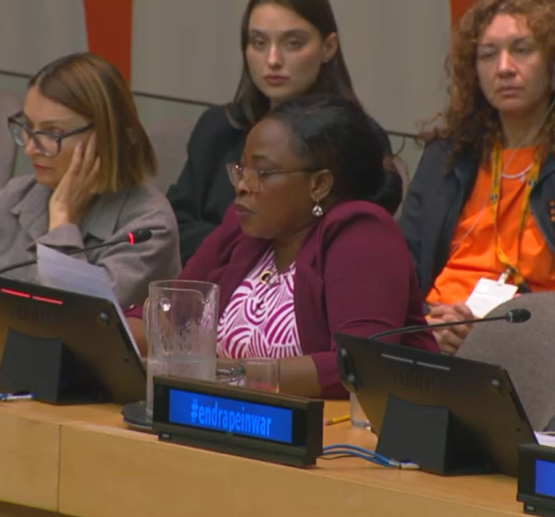“Awakening” to the Continuing Nightmare of the Darfur Genocide
“Awakening” to the Continuing Nightmare of the Darfur Genocide
Eric Reeves, 17 December 2014
The Obama administration seems finally to have found its voice again in speaking about ongoing genocide in the Darfur region of Sudan. More than a decade after rebellion and conflict began, some three million people are internally displaced or refugees in neighboring Chad. More than 800,000 have been displaced in the past two years; some 2 million human beings have been newly displaced since the disastrously conceived and badly failing UN/African Union Mission in Darfur (UNAMID) took up its civilian protection mandate in January 2008. The death toll from the direct and indirect consequences of violence now exceeds 500,000—and mortality looks to be poised to rise steeply given reduced humanitarian capacity.
After seven years of distinguishing itself only by being the largest, most expensive, and least effective peacekeeping operation in UN history, UNAMID seems to be close to an ignominious demise. Khartoum recently demanded that the UN make plans to pull UNAMID out of Darfur in the near term—probably a period defined by the expiration of the current UN Security Council authorization (through June 2015). Not coincidentally, this demand comes after UNAMID’s botched investigation and public report on the mass sexual assault against the women and girls of Tabit, North Darfur. Tabit is a village of some 7,000 people (estimates vary, especially since so many have fled in the wake of the assault, fearing retribution by Khartoum for having been the highly publicized victims of the regime’s brutality). From October 31 – November 1 more than 200 girls and women were raped, typically gang-raped—a reality confirmed by a great many eyewitnesses and Darfuri sources. Using material from Radio Dabanga, the Times of Australia reports:
The Sudanese soldiers entered the village in Darfur about 8pm. Systematically, they went from house to house, beating the men and raping the women and girls. “They raped 210 women and their daughters,” said an elder in the village of Tabit, northern Darfur. “We counted them all.” He said that “more than 500” soldiers came into the village of about 7,000 inhabitants after a soldier was reported missing.
“They entered every house, sometimes 10 together. The only ones who were not raped were those who could pay money.” The ordeal went on through the night. “There was nobody there to help,” he said. In another part of the village a mother of three sobbed and screamed as she described how four soldiers burst into her house, assaulted her husband and turned on her young daughters. (15 December 2014)
UNAMID’s anodyne and deeply disingenuous public report on its “investigation” at Tabit concluded:
None of those interviewed confirmed that any incident of rape took place in Tabit on the day of that media report. The team neither found any evidence nor received any information regarding the media allegations during the period in question. (UNAMID report on its investigation of reports from Tabit, North Darfur, 10 November 2014; notably, the report can’t easily be found on the UNAMID website, but may be accessed here)
But the “internal” report on the investigation—leaked to me by a highly reliable source and also briefly reported on by Agence France-Presse—made clear that there was in fact no meaningful investigation, merely questions asked of people who were clearly terrified of speaking the truth (For a detailed time-line of the events and investigation at Tabit, see my account of 10 November 2014). Each investigator was accompanied by two or three security or military personnel. Interviewees were photographed by security officials. One paragraph in particular gives a sense of how deeply misleading the public UNAMID report is:
Beside access issue, significant challenges were faced on the ground during verification exercise. The Sudan Armed Forces (SAF) personnel were present in sizable numbers – in uniform and civil clothing – in Tabit. They followed the sub-teams during the verification exercise. Some of the sub-teams reported the interviews being captured on recording devices (mobile phone) by the SAF members. The behavior and responses of interviewees indicated an environment of fear and intimidation. Some of the sub-teams had to ask the military personnel to stop following them and also asked them to allow the conduction of interviews in some privacy. (UN/AU Tabit Integrated Field Mission, November 11, 2014; internal document received by email, 20 November 2014. Posted at | http://wp.me/s45rOG-5903 )
Here we should also consider the broader issue of UNAMID’s credibility. The Mission has been authoritatively reported, by a wide range of sources—including the former spokeswoman for the Mission—to have withheld and distorted critical information, and on most occasion simply hasn’t bothered to investigate or report at all, even when it has received real-time reports of significant and accessible atrocity crimes. An egregious case was reported by Reuters in September 2010, detailing UNAMID’s cowardly, finally despicable response to the massacre at Tabarat, North Darfur (see http://wp.me/p45rOG-Gi ).
In understanding what occurred at Tabit, we would do much better to look to another investigation, unimpeded by Khartoum’s military or security forces:
A delegation of five members of the Coordination Committee of Refugees and Displaced Persons in Darfur had also visited the village: “We just returned from Tabit on Friday [November 7] with a delegation, after two days of investigation. There we met 60 women and girls, we looked into their eyes while they told us they were raped by soldiers from 8 pm [on Friday, October 31] until 5:00am [on Saturday, November 1]. (Radio Dabanga [Tabit] 11 November 2014; full text of this crucial dispatch appears at | https://www.radiodabanga.org/node/83429 )
The Khartoum regime, however, took UNAMID’s public report as exoneration, even as it was clear to all who read the internal report that that the investigation had been worthless. The Security Council and others have thus demanded a full and authoritative investigation, but it is now certainly too late: Tabit has been largely deserted, especially by women and girls. Finding the victims of the brutal gang-rapes would be exceedingly difficult, although human rights investigators continue to seek direct, person-to-person interviews. Moreover, Khartoum has adamantly refused to allow any further investigation (Sudan Tribune, 17 November 2014). Such outrageous defiance is part of what lies behind the decision by International Criminal Court Prosecutor Fatou Bensouda to “hibernate” the UN Security Council-mandated investigation of atrocity crimes in Darfur:
“Given this council’s lack of foresight on what should happen in Darfur, I am left with no choice but to hibernate investigative activities in Darfur as I shift resources to other urgent cases,” said Bensouda in a briefing to the UN Security Council (UNSC) on 13 December. (Sudan Tribune, 14 December 2014)
It must be said as well that even the raping of more than 200 girls and women in Tabit can give us only a partial sense of the real scale of sexual violence in Darfur and the challenges Bensouda faces in securing justice in a land where impunity reins for all who serve the regime. Over the past decade many tens of thousands of rapes, chiefly gang-rapes by Arab militia forces, have occurred (see lengthy overview of what we know at | http://wp.me/p45rOG-Kw ).
Life and Death in Darfur
Malnutrition has skyrocketed and other humanitarian indicators have grown increasingly ominous for many months. There are water shortages at many camps as water tables drop perilously with such unprecedented human concentrations. Primary medical care and medicines are simply not available in many places, and Radio Dabanga regularly reports on significant mortality from disease among children and the elderly. Children under five, the most vulnerable population, have also been victimized by the UN’s refusal to release critical malnutrition data, particularly the most telling measure: Global Acute Malnutrition (GAM). I have written angrily for years about the refusal to provide critical malnutrition data, and perhaps that anger generated sufficient pressure that an internal UNICEF document was leaked to Nicholas Kristof of the New York Times, who posted the entire report on his New York Times blog site ( http://kristof.blogs.nytimes.com/2014/09/05/malnutrition-crisis-in-sudan/?_r=0 ). Among the highlights in the grim, and still confidential, report on malnutrition are specific figures (note: humanitarians generally consider the “emergency” or “crisis” level for GAM, among children under five who live in a conflict zone, to be 10 percent):
North Darfur: 28 percent acute malnutrition among children
South Darfur: 18 percent acute malnutrition among children
East Darfur: 15 percent acute malnutrition among children
South Darfur: 13 percent acute malnutrition among children
A second set of statistics, measuring chronic malnutrition—wasting or “stunting”—is equally terrifying and gives a sense of how long food shortages have been defining the lives of children:
Central Darfur: 45 percent
East Darfur: 40 percent
West Darfur: 35 percent
North Darfur: 35 percent
South Darfur: 26 percent
The report indicates that the World Health Organization cutoff point for “high” prevalence of chronic malnutrition is 30 percent, and for “very high” prevalence is greater than 40 percent. To put this in perspective, the percentage of under-fives who are moderately or severely wasted/malnourished in Sudan is so great that it places fourth from the bottom among the world’s ten countries with the highest levels of malnutrition (see my full account of the UNICEF report at | http://wp.me/p45rOG-1pL ).
Violence has been accelerating in Darfur for three years now, and is reaching a ghastly crescendo. Armed attacks on camps for displaced persons are commonplace, and the goal is clear: empty the camps and remove the rationale for a continued international humanitarian presence, something Khartoum has been pushing for over four years. This “mechanism” was referred to tersely by First Vice President (and Major General) Bakri Hassan Saleh at a meeting of the regime’s most senior military and security officials on August 31, 2014 (the minutes of this extraordinary meeting were leaked to me by a Sudanese of unimpeachable honesty and integrity, and have been judged, virtually unanimously, to be authentic by Arabic speakers familiar with the regime as well as those who study Sudan). Bakri’s order?
“Support the mechanism intended to disperse or empty the IDP camps.”
The increasing violence and brutality of assaults on camps as well as rural areas by the new Janjaweed—known as the “Rapid Response Forces” (RSF)—have been more frequent, more violent, more destructive. The RSF have also been deployed by Khartoum to do the regime’s genocidal bidding in South Kordofan and Blue Nile states in the southern part of Sudan.
“Slumbering”?
But I began by noting that the Obama administration seems finally to have found its voice again in speaking about Darfur. This may be true, but only with significant qualification. There has been no commitment to help provide security, even as UNAMID has struggled mightily for lack of the kinds of equipment only militarily advanced countries such as the U.S. could provide—particularly helicopters. Condemnation of the relentless bombing of civilians and civilian targets has been desultory at best. There has been no sustained outrage over the epidemic of sexual violence, or the immensely consequential and dangerous appropriation of non-Arab farmland and farms by Arab groups, typically heavily armed.
Peace cannot be made if such vast land theft is not reversed, and to date neither the U.S. nor the Europeans have made significant diplomatic commitment to resolving this explosive issue. At the same time, there has been no effective pressure on Khartoum to grant the promised freedom of movement for UNAMID and unhindered access for humanitarians.
Indeed, much U.S. diplomacy has been counter-productive. Former U.S. special envoy for Sudan Scott Gration proved a disastrously incompetent diplomat, and failed fundamentally to understand the Khartoum regime and what is was capable of. Gration is the major reason that the ill-conceived and completely unsupported Doha Document for Peace in Darfur (DDPD) remains the only basis for negotiating a just and lasting peace, much to Khartoum’s satisfaction, since the regime is well aware the DDPD has no support within Darfuri civil society or the main rebel groups.
Not surprisingly, during Gration’s tenure, a senior State Department official declared (as recorded in a State Department transcript) that Darfur was to be considered “de-coupled” from the major strategic issue between Khartoum and Washington: terrorism and counter-terrorism intelligence.
Here it is worth remembering that Senator, candidate, and President Obama repeatedly referred to Darfur as the site of “genocide,” and declared in one particularly unctuous moment:
The United States has a moral obligation anytime you see humanitarian catastrophes… When you see a genocide in Rwanda, Bosnia or in Darfur, that is a stain on all of us, a stain on our souls …. We can’t say “never again” and then allow it to happen again, and as a president of the United States I don’t intend to abandon people or turn a blind eye to slaughter. (Video recording of the statement available at | https://www.youtube.com/watch?v=QEd583-fA8M#t=15).
The words are exceedingly difficult to square with Obama’s Sudan policies in the face of what he has described as genocide—in the Senate, as a candidate for President, and as an elected President. And there certainly can be no justification for “de-coupling” in any way Darfur’s agony from our policy priorities in dealing with the serial génocidaires in Khartoum. Whatever words we use, there can be no disputing the vast, chaotic violence that engulfs all of Darfur, putting millions of lives at risk. One might think this enough.
But now we are to believe that the U.S. is (once again?) engaged. Associated Press reports (12 December 2014) that speaking at the UN, a U.S. deputy ambassador, David Pressman, declared:
“We must collectively and urgently wake from our slumber,” a U.S. deputy ambassador, David Pressman, told the council.
But “slumber” seems a particularly inappropriate word choice, given all that Pressman and others in the Obama administration (and officials in the Bush administration) have been well aware of since the beginning of fighting in early 2003. “Slumber” implies an unconscious state; what Pressman is really referring to is a sustained failure of attention—a refusal to respond meaningfully to Darfur’s all too conspicuous human suffering and destruction. And this failure, this refusal, has taken various forms: silence in the main, but also disingenuous statements, expedient policy decisions, and outright mendacity.
No, it is not that the U.S. has been “slumbering”; rather, Darfur provides yet another example of the continuing priority given to certain lives and not others in U.S. foreign policy. Tragically for Darfuris, they have nothing going for them other than their humanity, nothing the might increase their international profile or the “value” of their lives. The region sits remotely and largely inaccessibly in the very middle of the African continent; it has no valuable resources underground (with the possible exception of the Jebel Amer gold mining area); and the people are both black and Muslim; they harbor no terrorists nor can they help in the “global war on terrorism.”
All this militates against the possibility that Darfuri lives will be seen as valuable in the way that European, or Arabic, or Asian lives are. Khartoum is well aware of all this, and has made the problem more acute by denying all access to independent journalists and human rights reporters. And again, as if to remind the world of its attitude toward reporting on Darfur, the regime ordered UNAMID to close it human rights office in Khartoum. The regime has made it possible for the international community to treat Darfur as a “black box,” emanating no information, when in fact there is significant news flowing through the extraordinary Radio Dabanga, Sudan Tribune, and the occasional human rights report—all using sources inside Darfur.
So girls and women will continue to be raped despite Pressman’s declared “awakening”; the bombs will continue to fall on civilians and civilian targets in eastern Jebel Marra and elsewhere; land appropriations become more permanent by the day, threatening the chances of any meaningful peace agreement. Humanitarian conditions will continue to deteriorate, with corresponding increases in morbidity and mortality.
And when UNAMID is forced to withdraw, this will inevitably compel the withdrawal of international humanitarian organizations that have persisted in their work despite intolerable insecurity and the UN’s refusal to allow them to speak about what they know of the horrors of Darfur. Pressman and others, to the extent they believe that they are awakening from a “slumber,” must confront the all-too-real nightmare that is daily life for the people of Darfur.
[Eric Reeves, a professor at Smith College, has published extensively on Sudan, nationally and internationally, for the past fifteen years. He is author of Compromising with Evil: An archival history of greater Sudan, 2007 – 2012 (September 2012)]



